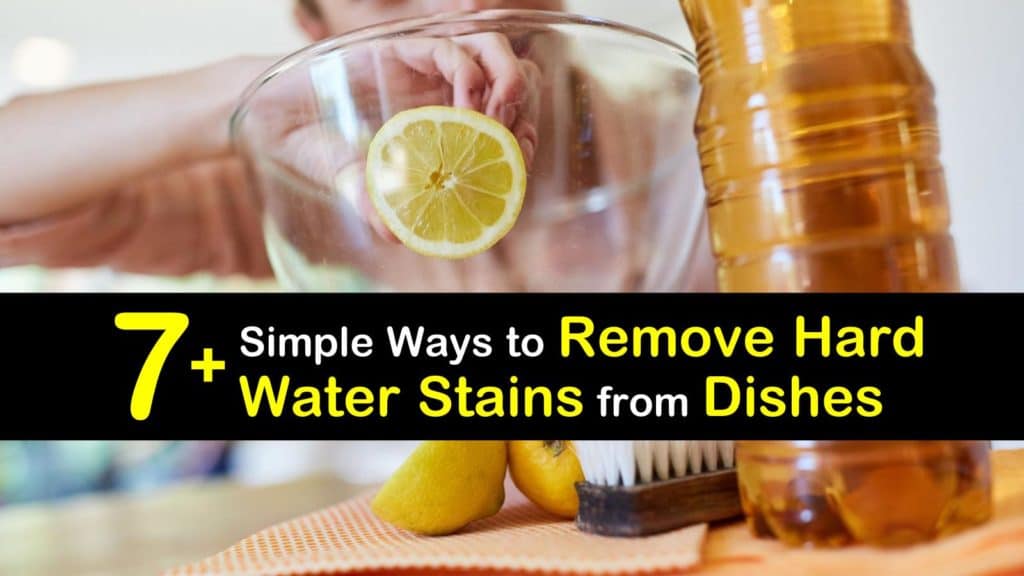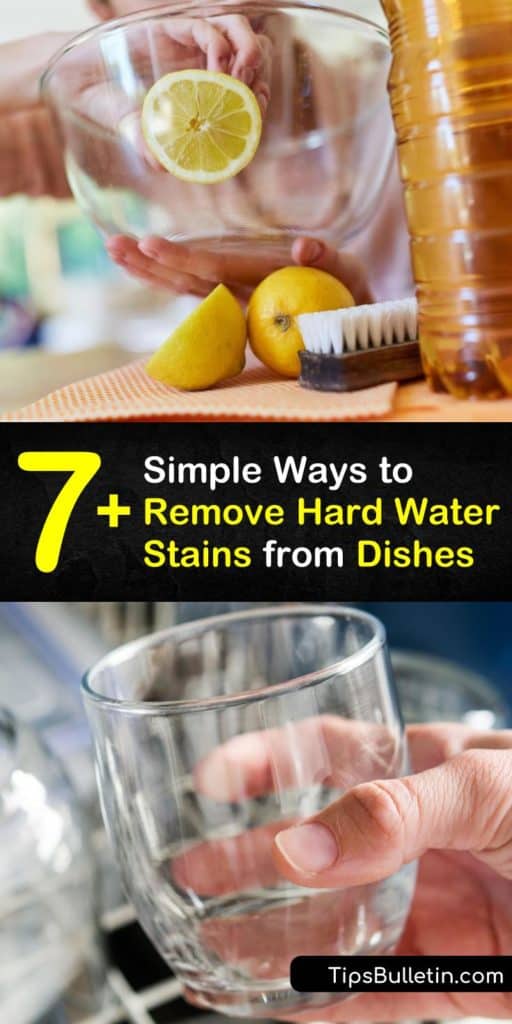The hard water in your home results from magnesium and calcium mineral deposits that make their way into your water supply. After the water evaporates, the mineral deposits leave a white powdery buildup on the surface. Learning how to remove hard water stains off dishes is simple using the DIY recipes we provide.
Hard water stains are common in rural and urban homes, so it is critical to know how to remove hard water deposits off your silverware and glassware.
We show you how to eliminate hard water spots on dishes and other familiar places where water spots occur, like a showerhead and faucets. If you use a dishwasher to clean your dishes, knowing how to remove limescale buildup in the dishwasher is vital.
When your dishwasher has considerable mineral buildup, it leaves hard water stains on your dishware. This article shows you how to remove these annoying water stains using everyday household cleaning products.

- Removing Limescale Stains from Dishes
- Removing Hard Water Stains on Dishes using Vinegar
- How to Prevent Hard Water Stains on Dishes in the Dishwasher using Baking Soda
- Dirty Glassware
- Lemon Juice will Effectively Prevent Hard Water Stains on Dishes
- Removing Mineral Deposits with Lemi Shine
- Remove Mineral Deposit Buildup on Dishwasher Racks
- How to Remove Hard Water Stains from Dishes using Dish Soap
- Using Bleach to Remove Hard Water Stains
- Removing Hard Water Stains with Borax
Removing Limescale Stains from Dishes
Hard water is responsible for the white residue that builds up in your showerheads, bathtubs, faucet heads, dishwashers, and dishes. Some people think the only way to prevent hard water stains from occurring is to purchase a brand new water softener.
However, regular products like vinegar and lemon juice successfully eat away at the mineral content in your dishwasher. You may be surprised at what can you use instead of dish soap to clean your glasses and dishes.
Removing Hard Water Stains on Dishes using Vinegar
Learning the technique for how to remove hard water stains from dishes with vinegar is quite simple. Vinegar contains acids that are excellent at eating through mineral deposits, dirt, and grime. Use vinegar for glass stains and for those on your dishes and bakeware.
The acidic compounds of vinegar make it an easy DIY way to disinfect your dishwasher to prevent hard water stains on dishes in the dishwasher, too.
Use paper towels, and pick up all the leftover food debris that sits at the bottom of your dishwasher. Fill a small cup with vinegar and place it on the top rack of the dishwasher. It is essential to make sure the cup that you use is dishwasher safe.
Run a wash cycle with the hottest water available and nothing else in the dishwasher besides the cup filled with vinegar.

Finish by wiping your dishwasher down with paper towels to remove excess mineral deposits. This procedure prevents hard water stains from forming on your glassware that you clean in the dishwasher.
How to Prevent Hard Water Stains on Dishes in the Dishwasher using Baking Soda
Dishwashing makes cleaning dishes much simpler than washing your glassware by hand. To prevent hard water stains on dishes, it is critical to remove limescale buildup in your dishwasher correctly.
Developing a mixture of baking soda and hydrogen peroxide utilizes ingredients that dissolve grease and mineral deposits after interacting with water and are great substitutes for dish soap for cleaning dishes and glassware.
Mix the ingredients until they transform into a sandy, paste-like material, and use a spoon to create large balls. Place the balls at the bottom of the dishwasher and let them sit overnight.
In the morning, put a glass filled with vinegar on the top rack of the dishwasher. Run a wash cycle and a rinse cycle on the hottest possible temperature to eliminate limescale and prevent hard water stains on dishes in the dishwasher.
Dirty Glassware
Did you know that you can take care of cleaning cloudy glasses with toothpaste? Some stains respond well to this bathroom staple. Try it if you have a particularly difficult hard water stain.
Lemon Juice will Effectively Prevent Hard Water Stains on Dishes
There are a wide array of home remedies for cleaning your dishwasher, including the powerful disinfectants found in lemon juice.
Lemons include natural antiseptic ingredients and citric acid that function as bleach to prevent hard water stains on dishes after dishwashing.
Mix the ingredients in a safe dishwasher cup and place it on your dishwasher’s top rack. Run a wash cycle at the highest possible temperature with only the cup in it. It is vital not to include any other dishes as you are cleaning your dishwasher.
The extra glassware hinders the cleaning process and may not eliminate all the mineral deposit buildup. If all the mineral deposits are not eaten away after one wash cycle, we recommend adding a few more teaspoons to the recipe and rerunning the wash cycle.
Removing Mineral Deposits with Lemi Shine
Learning how to remove hard water stains on dishes and other household areas where limescale buildup is prevalent is made easy with Lemi Shine.
Lemi Shine contains citric cleaning agents that are natural and effectively eat away at the mineral deposits found on your stainless steel appliances.
The citric acids found in Lemi Shine are not only a powerful way to combat mineral buildup, but they also contain safe and natural ingredients.
If you prefer to wash your dishware by hand, use Lemi Shine dish soap to remove hard water stains on dishes. Lemi Shine offers specially designed dish soap to cut through tough grease and buildup.
Fill your soap dispensers with the dish soap and clean your silverware with warm soapy water. After scrubbing your dishware clean, continue by rinsing off the soap and letting your dishes air dry.
Remove Mineral Deposit Buildup on Dishwasher Racks
Limescale buildup is incredibly challenging to remove on your dishwasher racks. The intricate formation on the top and bottom racks make it difficult for mineral deposit detergents to get rid of every area affected.
Making a homemade all-purpose cleaner helps remove hard water stains on your dishwasher racks.
Dump the ingredients into the spray bottle and shake gently. Spray the solution on your dishwasher racks and let it sit for one minute.
Wipe your dishwasher racks with a paper towel. This approach effectively cleans mineral deposits off hard to reach areas that the rinse aid dispenser misses.
How to Remove Hard Water Stains from Dishes using Dish Soap
Understanding how to remove hard water stains from dishes is easier with dish soap specifically designed to break through hard water stains.
Dish soaps with a water softener eat away at limescale buildup in your dishwasher or any other household appliance. To effectively use dish soap with a water softener, fill your sink with warm water and the soap.
Wash your dishes by hand using a sponge or cloth and scrub away at the hard water stains. You can also use this approach to clean your dishwasher and eliminate mineral deposits found at the bottom of the appliance.
Fill the dispenser with your dish soap that includes a water softener and run a wash cycle with the highest heat possible.
Using Bleach to Remove Hard Water Stains
Using household bleach helps in removing hard water spots on dishes and is ideal as a dishwasher mold cleaner. Bleach is made up of chemicals designed to disinfect the surfaces it interacts with and remove stains.
Utilizing bleach to remove hard water stains is a practical technique because it only uses one ingredient commonly found in a household.
Fill a spray bottle with bleach and spray the bleach on any area where there is a hard water stain, including showerheads or sinks.
Scrub away at the area with a sponge or an old toothbrush before rinsing out the chemicals with warm water. We recommend that you let the dishes or the surfaces that you have cleaned with bleach air dry completely before using them again.
Removing Hard Water Stains with Borax
Borax is an outstanding cleaner that removes hard water stains found on any appliance or surface. Borax transforms some of the water into hydrogen peroxide when the substance interacts with hot water.
This chemical reaction not only kills bacteria and germs but makes cleaning various surfaces with mineral deposit buildup easier. Learning how to remove hard water stains off dishes with Borax is simple.
Additionally, if you have limescale buildup on your sinks or any other surface, Borax breaks away the mineral deposits.
To prevent hard water stains on dishes in the dishwasher, run a wash cycle with Borax in the dispenser. Run a wash cycle on high heat to break away mineral deposits in your dishwasher so your dishes will not develop hard water stains.
Hard water buildup negatively impacts the function of your dishwasher and other appliances around your house. Limescale buildup also leaves noticeable water stains on your glassware and silverware after washing them in the dishwasher.
Removing mineral deposit buildup is easy using DIY techniques, including the ingredients in vinegar and baking soda.

If you learned how to remove hard water stains from dishes in this article, please share these simple techniques to prevent and get rid of hard water spots on dishes via Facebook and Pinterest with your family members.